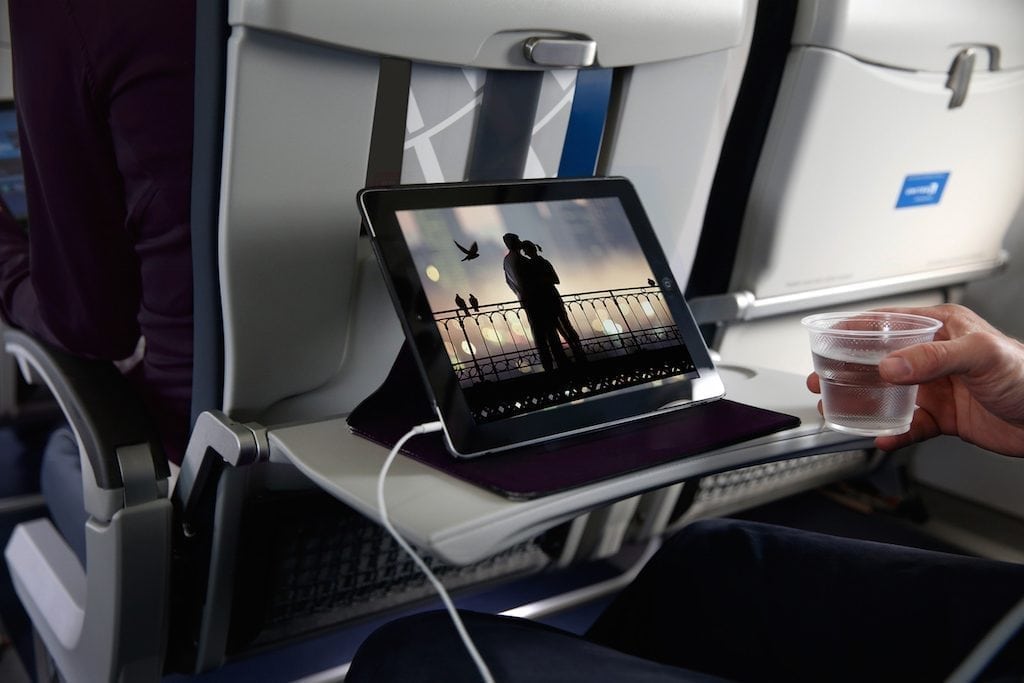When in-flight Wi-Fi doesn’t work, as happens all too frequently, airlines often offer a simple response — don’t blame us.
Yes, the airlines advertise and sell internet, and when it works properly, they’re happy to take credit. But like their passengers, airlines are at the mercy of suppliers to ensure reliability. Some systems work better than others, but none is exactly like a passenger’s home internet, no matter what Gogo or ViaSat claims.
Will it improve?
Maybe, United Airlines Chief Digital Officer Linda Jojo told me recently. But Jojo, who has had a long career working in technology, said she is a realist. Getting Wi-Fi to the plane is an advanced problem, even if passengers don’t know it.
“There is this thing called physics, and it probably always will be in the way,” she said.
What’s odd is that airlines don’t communicate this to passengers. Many airline executives know they need fast, reliable Wi-Fi to keep pace with competitors, so they overpromise what they can provide. But wouldn’t it be better if airlines were honest about what passengers could expect?
It makes no sense that customers demand a ground-like experience without understanding why the ground and the air are different. As Jojo put it:
“Never forget that you’re going hundreds of miles an hour at 35,000 feet, [with the connection] beaming from a satellite orbiting the earth. The reality is, it will probably never be as good as your living room, because let’s face it, your living room is going to get faster too.”
What do you think? Should airlines better communicate to customers what they should expect from in-flight Wi-Fi? Let me know via email or Twitter.
— Brian Sumers, Aviation Business Editor [bss@skift.com, @briansumers]
Stories of the Week
Skift Tech Forum Preview: United’s Chief Digital Exec on Fixing In-Flight Wi-Fi: In this interview with Jojo, I touched on several topics, including why the threat of cyber attacks worries her. I’ll interview Jojo on stage on June 12 at the first Skift Tech Forum in Silicon Valley. Tickets are still available.
These U.S. Airline CEOs Made the Most Money Last Year: Delta Air Lines CEO Ed Bastian made more money than his peers last year, and he probably deserves it, given Delta is the most consistently profitable U.S. airline. How well did other CEOs make out last year? Read the story to find out what every U.S. airline CEO was paid in 2017.
U.S. Airlines Lose Tolerance for Money-Losing Flights as Fuel Prices Rise: Nothing refocuses airline executives like rising fuel prices. If they continue to creep up, expect airlines to cancel more marginal routes, like American Airlines’ Chicago-Beijing route, which goes away in October.
U.S. Issues New Requirements for Russian Planes in Airspace Spat: The U.S. State Department wants to reach a long-term deal with Russia that will allow U.S. passenger and cargo airlines to fly over Russia. But Russia doesn’t seem interested in ongoing talks. Now, the United States is trying to exert some leverage. Will it work?
These 10 U.S. Zip Codes Buy the Most Travel Online: My colleague Sean O’Neill worked with Adara, a Palo Alto-based travel data aggregator, to pinpoint the U.S. zip codes that buy the most travel online, and the results are fascinating. According to the data, travelers in the 60602 zip code — that’s Chicago — buy more travel than consumers in any other U.S. zip code.
Medical Emergencies Treated by Onboard Doctors Present Quandaries for Airlines: When there’s a medical emergency on board, who makes the call about what to do? Often, as this Bloomberg story explains, it’s a third party like MedAire Inc., which provides in-flight medical advice to more than 100 airlines. MedAire’s experts are far less likely to recommend pilots divert to the nearest airport than doctors on the aircraft. “Doctors, they tend to recommend diversions more than we do, because of course they don’t want to assume the long-term responsibility,” a MedAire executive told Bloomberg.
More Jobs Will Be Cleared for Takeoff. Aspiring Pilots Are Ready: We know it’s finally a good time to be an airline pilot. But how good? The New York Times says nearly every aspiring pilot who wants a job can find one. “I’ve never seen the industry be at this level of pilot demand,” Kenneth P. Byrnes, the chairman of the flight training department at Embry-Riddle Aeronautical University, told the newspaper. But are things really different now? Or will prospective pilots rush to join the industry only to face furloughs in a few years?
After 41 Years, Former Braniff International Pilots Gather for One Last Cookout: This is a neat story from Conor Shine of the Dallas Morning News. For more than 40 years, ex-Braniff pilots have gathered near Dallas to swap stories about the old days. But the group is getting older, so this was the last official cookout. “We had a nice run,” one pilot said. “We enjoy it and we enjoy each other’s company. We’ll still have meetings until the last guy dies, I guess.”
See You in Sydney?
I’m attending IATA’s annual general meeting in Sydney, June 3–5. My schedule during the day is packed, but I’m looking forward to the networking events. If you see me at one of them, come say hello.
Keep in Touch
Skift Aviation Business Editor Brian Sumers [bss@skift.com] curates the Skift Airline Innovation Report. Skift emails the newsletter every Wednesday. Have a story idea? Or a juicy news tip? Want to share a memo? Send him an email or tweet him.
Subscribe to the Skift Airline Innovation Report
Subscribe to Skift Pro to get unlimited access to stories like these
{{monthly_count}} of {{monthly_limit}} Free Stories Read
Subscribe NowAlready a member? Sign in here
Subscribe to Skift Pro to get unlimited access to stories like these
Your story count resets on {{monthly_reset}}
Already a member? Sign in here
Subscribe to Skift Pro to get unlimited access to stories like these
Already a member? Sign in here
